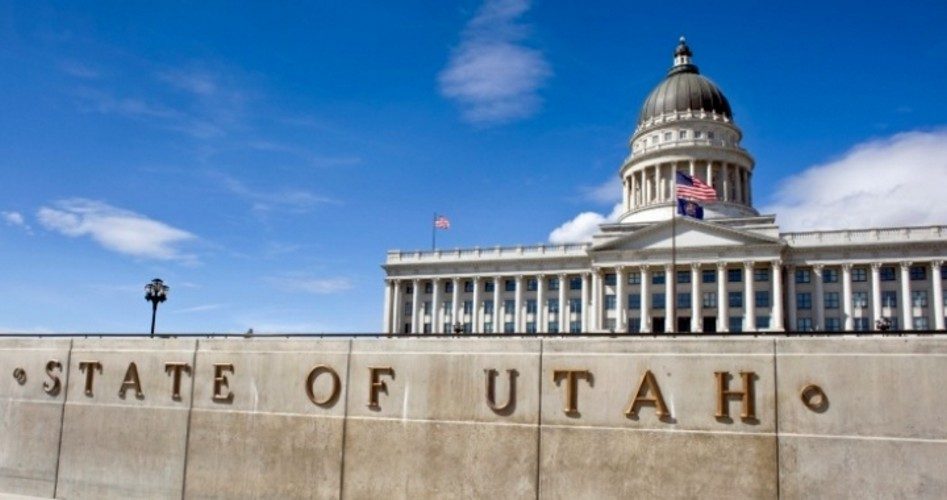
Utah is a land of contradictions. Early in January, Governor Gary Herbert goes to D.C. with his hat in his hand, looking for more federal “investment” in Utah. Then, earlier this week during his annual “State of the State” address, he promises he will stand up for his state’s sovereignty and that he will stand up to federal overreach.
On January 14, for example, Governor Herbert made the annual pilgrimage to the White House to petition the president for more money. Herbert and several other governors spent about an hour and a half talking to the president and vice-president about “energy, transportation, public lands and health care.” The state executives were trying to find “an optimal point” between state and federal power in these areas, according to comments made by Herbert to the Deseret News.
Fast forward, then, to January 29, and Herbert is standing in front of the Utah State legislature, delivering his “state of the state” address. Outside of D.C. and after having already secured his place at the trough, Herbert strikes a more defiant, independent tone. Speaking of the challenge of “asserting [Utah’s] rightful role as a sovereign state,” Herbert said:
James Madison, the father of our Constitution, said: “The powers delegated by the proposed Constitution to the federal government are few and defined. Those which are to remain in the state governments are numerous and indefinite.”
Unfortunately, our nation has strayed from what our founding fathers intended. Whether the issue is marriage, Medicaid or management of our public lands, our right to find Utah solutions to Utah issues is being hindered by federal overreach.
In Utah, we understand state sovereignty, and we will do everything in our power to represent the will of the people while respecting the democratic and judicial processes.
The change in altitude from D.C. to Salt Lake City must have affected Herbert’s short-term memory. Two weeks before proclaiming his state’s sovereignty and “right to find Utah solutions to Utah issues,” he’s standing in the Oval Office with his hat in his hand asking the feds for money.
It’s not just money Governor Herbert would like to see shipped in from Washington, D.C. to Utah, however.
Last year, Herbert began lobbying the Obama administration for Utah to become one of the six drone testing sites to be established this year by the Federal Aviation Administration (FAA).
Although the six sites have been chosen and Utah wasn’t one of them, Salt Lake City’s NBC affiliate KSL reported in December, “State officials have said they still hope to develop the unmanned aerial systems industry.” The ACLU writes that Utah will apply to the FAA for a waiver, clearing the way for the drones to come to Utah.
The chance that such a waiver will be granted has prompted a Utah state lawmaker to propose guidelines for the use of the devices in advance of any launch in the Beehive State.
Days ago, state Senator Howard Stephenson introduced Senate Bill 167, a measure to establish “provisions for the appropriate use of unmanned aerial vehicles by government entities.”
The bill explicitly forbids state agents from operating a drone, except in the following lengthy list of exceptional situations:
the target of the operation provides written consent;
an emergency threatens the life or safety of an individual;
an emergency threatens national security interests;
an emergency is created by activities characteristic of organized crime;
a warrant is issued for the operation of the unmanned aerial vehicle; or
the operation of the unmanned aerial vehicle is approved by a supervisory official who documents the factual basis for the emergency; and
no later than 48 hours after the agent of the state begins operation of the unmanned aerial vehicle, the supervisory official files a sworn statement setting forth the grounds for the operation of the unmanned aerial vehicle;
the emergency situation requires the operation of the unmanned aerial vehicle before a warrant or order can be obtained;
there are grounds upon which a warrant or order could be obtained to authorize the operation;
the unmanned aerial vehicle is used for a purpose other than law enforcement or intelligence gathering; and
no information or evidence derived from the operation of the unmanned aerial vehicle is intended for use in a trial, hearing, or other adjudicative proceeding, including before any court, grand jury, department, officer, agency, regulatory body, legislative committee, or other authority of the state or political subdivision of the state.
Should a state official’s request for drone deployment be approved, Senator Stephenson’s bill imposes additional restrictions on the use of the vehicles, restrictions seemingly aimed at protecting the privacy rights of the individual targeted.
In fact, information on people, structures, and areas other than the intended target may not be obtained. If it is accidentally obtained, it may not be used and must be destroyed within 24 hours.
Also explicitly forbidden is the use of facial recognition “or other biometric matching technology.”
In what is perhaps the most foresighted provision in the bill, the equipping of any drones with a weapon is specifically outlawed.
Senator Stephenson is wise to fire a preemptive legislative strike at the use of drones, particularly in light of Utah’s eager embrace of other agencies of the surveillance state.
Honing in on the purported economic benefit of the state’s participation in the expansion of the surveillance state is a well-practiced art in Utah, from the state capitol to the local media.
Just west of Interstate 15 — the state’s principal north-south corridor — is the National Security Agency’s Utah Data Center.
The $2-billion campus is up and running and is equipped with computers capable of monitoring, recording, and cataloging every electronic communication of every American indefinitely.
A story in Wired published in 2012 describes the purpose of the massive compound:
Flowing through its servers and routers and stored in near-bottomless databases will be all forms of communication, including the complete contents of private emails, cell phone calls, and Google searches, as well as all sorts of personal data trails — parking receipts, travel itineraries, bookstore purchases, and other digital “pocket litter.”
How did local media report on this threat to the Fourth Amendment being built in Utah?
“The data center is estimated to be 1 million square feet, sitting on 200-acres, and it couldn’t come at a better time for Utah’s economy,” reported KSL. The report exulted that “even Congressman Jason Chaffetz is excited. From Washington he told KSL News: ‘It’s a benefit to our economy and our national security.’”
Curiously, although it lost out in the drone testing lottery, the governor’s website still makes the case that when it comes to unmanned aerial vehicles, there’s no place like Utah. The Office of Economic Development’s website reminds the feds of Utah’s pro-surveillance, pro-military industrial complex resumé:
If you develop or test unmanned systems you need space, infrastructure, talent and a good supply chain. In other words, you need Utah.
Our unique setting in the high desert of the Intermountain West provides hundreds of square miles and 58,000 feet of elevation for testing. As a specific industry cluster our state government is interested in growing, unmanned systems companies can find the incentives, support, workforce development and business-friendly environment they need to thrive. And an existing community of industry leaders such as L-3 Communications, Northrop Grumman, General Atomics and AeroVironment ensure a robust and fully functioning supply chain.
Not even a hint at the legitimate concerns about these products’ potential violations of the Fourth Amendment’s protection against unwarranted searches and seizures. The Fourth Amendment reads:
The right of the people to be secure in their persons, houses, papers, and effects, against unreasonable searches and seizures, shall not be violated, and no warrants shall issue, but upon probable cause, supported by oath or affirmation, and particularly describing the place to be searched, and the persons or things to be seized.
In Utah, it seems, when it comes to hosting the forces of the surveillance state, even a long shot at more jobs and money trumps the very real threat to liberty and the Constitution posed by these ventures.
Drone technology developed for the military will soon be deployed in the domestic skies, and citizens will be instantly transformed into suspects. States and cities must now step into the gap and defend citizens from being deprived of their most fundamental rights. Utah State Senator Stephenson is taking a small, but laudable step toward that goal.
Joe A. Wolverton, II, J.D. is a correspondent for The New American and travels frequently nationwide speaking on topics of nullification, the NDAA, the Second Amendment, and the surveillance state. He is the co-founder of Liberty Rising, an educational endeavor aimed at promoting and preserving the Constitution. Follow him on Twitter @TNAJoeWolverton and he can be reached at [email protected].



